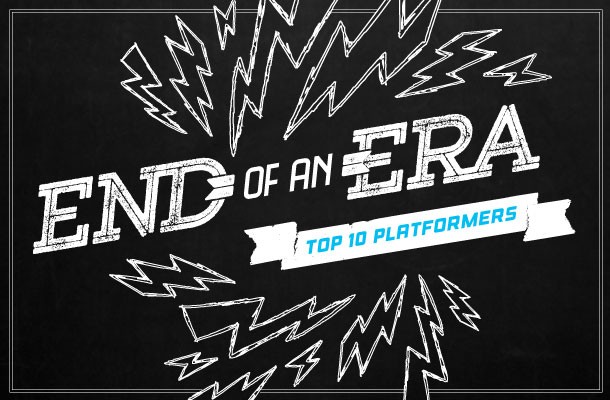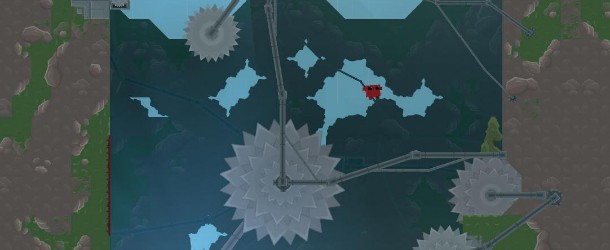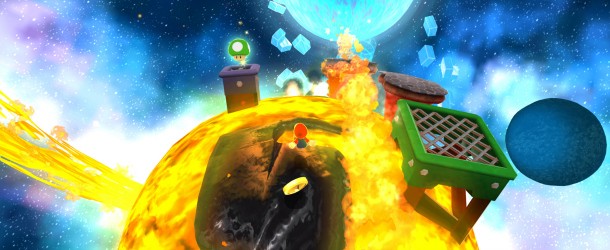Top 10 Platformers Of The Generation

We take a look at the 10 games that defined – and redefined – the platforming genre in this past generation.
It was an interesting console generation for the storied platforming genre. While it isn't the commercial powerhouse it once was, the genre grew in many ways - both by evolving in new directions and by returning to its roots.
The days of big-budget 3D platformers are largely behind us (with a few amazing exceptions, thankfully), but the list below proves that developers can still mine fun gameplay from the basic running-and-jumping mechanics of the genre. The list is remarkably diverse, and one that shows that the platformer was in fine form artistically during this past generation.
10. A Boy and His Blob (Wii - 2009)
WayForward Technologies has a knack for bringing our gaming past back to life in ways that are even better than we remembered. Like many of its other titles - Contra 4, Double Dragon Neon, DuckTales Remastered - A Boy and His Blob reimagines the NES classic for a new generation of gamers. Featuring new levels, art, gameplay, and improved mechanics, this puzzle/platformer requires both reflexes and guile to negotiate its environments with the help of an amorphous, jellybean-loving friend.
9. Donkey Kong Country
Returns (Wii - 2010)
The Donkey Kong Country games are some of the defining titles of the SNES era, so the announcement that Metroid Prime developer Retro Studios was creating an all-new 2D DK adventure was met with happiness from Nintendo faithful. Donkey Kong Country Returns does not disappoint. The 2D worlds are gorgeous, and the gameplay stays close to the original formula while adding those small moments of ingenuity and refinement we expect from first-party Nintendo titles.
8. Ratchet & Clank
Future: Tools of Destruction (PS3 - 2007)
Ratchet & Clank had a quietly great generation, adding to its resume with traditional platformers and experiments like All 4 One. Its one large-scale PS3 entry, 2007's Tools of Destruction, didn't make any major changes to the formula, but plays like a master class in platformer development. It's everything the PS2 classic were, only bigger, better looking, and more polished. Tools of Destruction is one of the truly underrated games of this past generation.
7. Limbo (Xbox 360, PS3
- 2010)
Not many platformers conjure up adjectives like "haunting," "chilling," and "ethereal," but Limbo breaks the mold. PlayDead's unique project is rendered in a gauzy black-and-white style that evokes a sense of dread and mystery. The action is often tense, and the storytelling gives you little direction as to what the small child protagonist's motivation is. As a result, many wild theories about the plot and its meaning proliferate on the Internet to this day. Though short, Limbo sticks with you long after you've finished. There's nothing quite like it.
6. New Super Mario Bros.
(Wii - 2009)
The character that's synonymous with the platformer came roaring back in this past generation with a round of new classics. New Super Mario Bros. shows off Nintendo's knack for readdressing the past while subtly moving into the future. The game is, as the name suggests, a throwback to the series' 2D NES days. However, it places an emphasis on four-player co-op, making this a multiplayer Mario experience that is both chaotic and addictive - as long as your teammates don't kill you too often. To Nintendo's credit, the levels are designed so expertly that it plays equally well solo.
5. Rayman Legends (PS3,
Xbox 360 - 2013)
Ubisoft's UbiArt engine is remarkably versatile, as shown by its use in games like Valiant Hearts and Child of Light. Rayman Legends uses the same framework to dazzling effect, creating a 2D platformer that's both visually and mechanically inventive. The game is hectically paced - a crazy quilt of lightning-quick platforming and novel one-off gameplay moments. It never stops surprising the player; who among us would have guessed that one of 2013's best games would have featured a button-pressing segment set to Ram Jam's classic-rock warhorse "Black Betty?"
4. LittleBigPlanet 2
(PS3 - 2011)
Media Molecule makes games of incredible charm. LittleBigPlanet's lumpy hero Sackboy quickly became a fan favorite thanks to the original's unique design and unprecedented creation tools. LittleBigPlanet 2 does exactly what a sequel should - it keeps everything that was good about the first game while making it bigger, better, and more polished. LittleBigPlanet has better levels, more intuitive level creation tools, and - most importantly - slightly tweaked physics that make the demanding platforming less "floaty" and far less frustrating.
3. Super Meat Boy (Xbox
360 - 2010)
Super Meat Boy is the generation's most unlikely hit. Starring a piece of sentient meat (or "scented meat" as True Detective's Marty Hart would say), its graphics are primitive. It is tremendously hard and unforgiving in an era of games that hold a player's hand from beginning to end. Despite these obstacles, Team Meat's creation became an underground sensation that went mainstream. It turned out that many gamers actually missed the difficult platforming of the 8- and 16-bit eras, something that Super Meat Boy delivers with more polish than the games that inspired it. Retro in appearance, progressive in execution, Super Meat Boy is at the vanguard of a new generation of games that make magic out of older styles of game design.
2. Braid (Xbox 360, PS3
- 2008)
Braid is a hard game to place in a neat category, but it has enough of the hallmarks of the platformer to qualify for this list. No matter the genre, it's a singular gaming experience. Designer Jonathan Blow took the conventions of the 2D platformer and created a mystifying action/puzzle game that allows the player to bend the fabric of time. Along your journey, you also unravel a highly symbolic and open-to-interpretation plot that contemplates loss, regret, and (possibly) nuclear destruction. It's one of the finest games of this or any other generation.
1. Super Mario Galaxy (Wii
- 2007)
The king came back for his crown. Super Mario Galaxy is everything we want from Mario games. It instantly turns heads with its small, interconnected orbital levels. This is a small bit of genius, simultaneously making the game feel more compact and more expansive. Like many of the great Mario games, it puts a unique spin on the familiar. As you progress, it expands beyond spherical level design, crafting worlds that truly must be played to be believed. While many of the big games of this generation rely on huge set-piece moments to create an impression, Super Mario Galaxy's joys are found in hundreds of little moments - the joy of pure gameplay.









